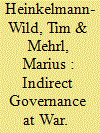| Srl | Item |
| 1 |
ID:
183149


|
|
|
|
|
| Summary/Abstract |
Instead of attacking their adversaries directly, states often do so indirectly by supporting rebel groups. While these support relationships vary considerably, existing research lacks a comprehensive account thereof. To explain states’ choice of support, we suggest differentiating between two modes of support relationships according to the control opportunities they offer states over rebels: while delegation enables “hands-on” control, “hands-off” orchestration allows for plausible deniability and does not harm rebels’ local legitimacy. We argue that sponsors prefer orchestration when “hands-on” control can be substituted by goal alignment or competition; and they prefer delegation when the conflict is highly salient. Tests using global data for the period 1975-2009 support the first two expectations. Surprisingly, states’ capabilities also render “hands-off” orchestration more likely. The paper advances the understanding of external rebel support by transferring insights from indirect governance theory to the study of indirect wars and putting it to statistical test.
|
|
|
|
|
|
|
|
|
|
|
|
|
|
|
|
| 2 |
ID:
184668


|
|
|
|
|
| Summary/Abstract |
Intergovernmental, regional, and international organizations play an active role in the governance of transnational crises. In the context of the COVID-19 pandemic in Latin America, the World Health Organization and the Pan-American Health Organization have been linked with multiple actors and levels of decision-making, putting into practice what the literature on global governance refers to as indirect governance by orchestration. This article shows that, in practice, the mechanisms of orchestration have established heterogeneous models of coordination and action that, in situations of transnational crisis, allow these organizations to bring together resources, capacities, and authority.
|
|
|
|
|
|
|
|
|
|
|
|
|
|
|
|